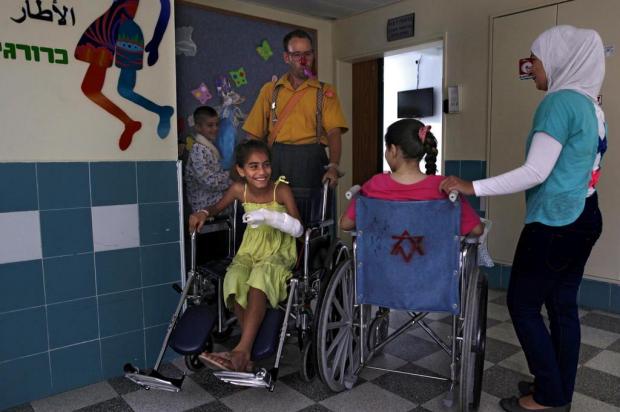Através da fronteira proibida, médicos de Israel tendem a ajudar feridos da Síria

A garota de 3 anos chamava "mamãe, mamãe" sem parar enquanto um estranho a balançava no colo e tentava reconfortá-la. Ela foi trazida da Síria para o hospital público nessa cidade ao norte de Israel cinco dias atrás, com o rosto queimado pelo que os médicos disseram ter sido, provavelmente, uma bomba ou um explosivo caseiro.
Na cama ao lado, uma garota de 12 anos, estava em sono profundo. Ela havia chegado à UTI infantil com uma ferida grave no estômago que já havia sido operada na Síria, e com um buraco nas costas.
Outra garota, de 13 anos, está aqui há mais de um mês se recuperando de ferimentos que precisaram de cirurgias complexas no rosto, braço e perna. Ela e o irmão, de 9 anos, haviam ido ao supermercado da vila quando uma bomba explodiu. Seu irmão morreu no ataque.
Conforme a briga entre forças do governo sírio e rebeldes cresce violentamente nos últimos meses em áreas perto das Colinas de Golã, parte de Israel, um grande número de acidentados sírios são discretamente transportados pela fronteira hostil atrás de tratamentos que podem salvar vidas em Israel, um país inimigo.
A maior parte é de homens entre 20 e 30 anos, a maioria deles com ferimentos de bala, que, provavelmente, estavam envolvidos na guerra. Porém, nas últimas semanas há mais civis com ferimentos de explosão, entre eles mulheres e crianças que chegaram sozinhas e traumatizadas.
Israel tem declarado repetidas vezes uma política de não intervenção na guerra civil da Síria, a não ser pela prontidão em atacar estoques de armas avançadas que considere uma ameaça à segurança. Autoridades também deixaram claro que Israel não abriria sua fronteira cada vez mais fortificada para um influxo de refugiados, assim como a Turquia ou a Jordânia fizeram, dado que Israel e Síria continuam oficialmente em estado de guerra.
Entretanto, as autoridades israelenses sancionaram essa pequena e discreta resposta à tragédia que toma conta da Síria, equilibrando décadas de hostilidade com as demandas de proximidade e vizinhança.
— A maioria chega aqui inconsciente com ferimentos na cabeça — disse Dr. Masad Barhoum, diretor geral do Hospital Western Calilee, em Nahariya, na costa mediterrânea, 9,7 km ao sul da fronteira libanesa. — Eles acordam depois de alguns dias, ou seja lá quando for, e ouvem uma língua estranha e veem pessoas estranhas — disse ele. — Se eles conseguem falar, a primeira pergunta é: 'Onde estou?'.
Ele completou:
— Estou certo de que haja um choque inicial quando ouvem que estão em Israel.
A identidade dos pacientes é preservada para que eles não estejam em perigo ao retornar para a Síria. Soldados sentam do lado de fora da enfermaria onde ficam os adultos, para protegê-los de possíveis ameaças e de jornalistas intrometidos. Todavia, os médicos liberaram o acesso às crianças na área isolada da UTI, com a condição de que nenhum detalhe que pudesse comprometer a segurança delas fosse publicado.
Assim como muitos hospitais israelenses, esse atende a uma população mista de judeus e árabes; e a equipe conta com médicos, enfermeiras e assistentes sociais que falam árabe. No lobby, uma vitrine de vidro exibe os restos de um foguete Katyusha que foi disparado do Líbano e atingiu o departamento oftalmológico do hospital durante a guerra de 2006 entre Israel e Hezbollah. O foguete penetrou quatro andares, mas ninguém se feriu porque toda a ala norte foi movida para o subsolo.
Com uma estimativa de mais de 100 mil pessoas mortas na guerra civil da Síria, Barhoum, um cidadão árabe cristão de Israel, reconheceu que a assistência médica israelense foi "uma gota no oceano".
No entanto, ele disse que tinha orgulho do nível de tratamento que suas equipes puderam prover e que estava orgulhoso de ser um cidadão em um país que permitia que ele tratasse qualquer pessoa igualmente. Ele disse que o custo do tratamento até agora já soma centenas de milhares de dólares e será pago pelo governo de Israel.
Desde março passado, quase 100 sírios chegaram a dois hospitais na Galileia. Quarenta e um sírios severamente machucados foram tratados aqui no Hospital Western Galilee, que tem uma nova unidade neurocirúrgica, assim como instalações pediátricas de tratamento intensivo. Dois deles morreram, 28 se recuperaram e foram transferidos de volta para a Síria, e 11 permanecem aqui.
Outros 52 sírios foram levados ao Hospital Rebecca Sieff, na cidade Galileia de Safed. O último, um homem de 21 anos baleado e com ferimentos de estilhaços, chegou no sábado. Uma mulher, de 50 anos, chegou na sexta com um pedaço de estilhaço no coração e foi mandada ao hospital Rambam, ao norte, na cidade portuária de Haifa, para realizar uma cirurgia.
Pouco é revelado sobre como eles chegaram aqui, exceto que o exército israelense cuida da parte técnica da operação. Os médicos dizem que tudo o que sabem é que os pacientes sírios chegam em ambulâncias militares e que o hospital avisa o exército para vir buscá-los quando estão prontos para voltar para a Síria.
O exército israelense, que também opera em um hospital de campo e conta com equipes móveis de médicos ao longo da fronteira com a Síria, tem sido relutante em anunciar essas instalações, em parte, pelo medo de receber uma inundação de sírios feridos maior do que eles podem atender.
O tenente coronel Peter Lerner, porta-voz do exército, disse que "vários sírios vieram até a cerca ao longo da fronteira das Colinas de Golã com diversos tipos de ferimento."
Ele diz que o exército "em uma base puramente humanitária, facilitou assistência médica imediata em solo, e, em alguns casos, evacuou pessoas para tratamento adicional em hospitais israelenses."
Agora, esforços estão em curso para trazer parentes para ajudar a acalmar as crianças desacompanhadas.
Quando a garota de 13 anos chegou, ela estava em um estado de terror e de alta ansiedade, de acordo com o Dr. Zeev Zonis, chefe da UTI pediátrica daqui.
"Grande parte do nosso tratamento era tentar abraçá-la num tipo de abraço virtual", ele disse. Dias depois, a tia da garota chegou da Síria. Ela começou a cuidar das crianças sírias daqui, morando e dormindo com elas na UTI. A equipe de funcionários e voluntários doou roupas e presentes.
A tia, com o rosto enquadrado por um hijab apertado, disse que uma bomba explodiu no supermercado da vila de repente, depois de uma semana de tranquilidade. Poucos dias depois, ela disse, um homem árabe que ela não conhecia foi até a vila.
— Ele nos disse que ele estava com a garota — ela disse. — Eles me levaram e, no caminho, me disseram que ela estava em Israel. Nós chegamos até a fronteira. Eu vi os soldados. Eu fiquei com um pouco de medo.
Entretanto, ela completou dizendo que o cuidado no hospital tem sido bom e que "o medo passou totalmente". Ela estava relutante em falar sobre a guerra no país natal, dizendo apenas:
— Eu rezo pela paz e tranquilidade.
Sentada na cama com uma camiseta rosa do Ursinho Puff, a sobrinha, que estava sorrindo, disse que sentia saudades de casa. Ela e sua tia devem voltar para a Síria em breve.
Questionada sobre o que ela dirá quando voltar para casa, a tia respondeu:
— Eu não vou dizer que estive em Israel. É proibido estar aqui, e eu tenho medo das reações.
http://zerohora.clicrbs.com.br/rs/mundo ... 53677.html








